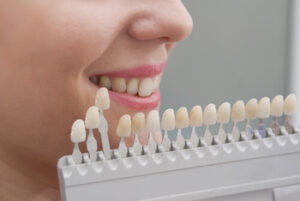When you flash your pearly whites, do you ever wish they were a bit more “pearly”? If you’ve ever marvelled at celebrities’ perfectly symmetrical, white-as-snow smiles, you may have wondered what their secret is. The secret often lies in the transformative power of dental veneers. But what are veneers? This comprehensive guide delves into the ins and outs of this groundbreaking cosmetic dentistry procedure, from types of veneers to what the dental veneer procedure involves.
What Are Veneers?
 In the realm of cosmetic dentistry, veneers represent a transformative leap. So, what are veneers? Simply put, they are custom-crafted, thin shells designed to cover the front surface of your teeth. Imagine them as the haute couture of dental aesthetics: stylish, unique, and meticulously designed to enhance your smile’s natural beauty. Created from either porcelain or composite resin materials, these aesthetic wonders can resolve a litany of dental concerns, from pesky discolourations to irksome gaps.
In the realm of cosmetic dentistry, veneers represent a transformative leap. So, what are veneers? Simply put, they are custom-crafted, thin shells designed to cover the front surface of your teeth. Imagine them as the haute couture of dental aesthetics: stylish, unique, and meticulously designed to enhance your smile’s natural beauty. Created from either porcelain or composite resin materials, these aesthetic wonders can resolve a litany of dental concerns, from pesky discolourations to irksome gaps.
The Genesis of Veneers
The concept of veneers isn’t as contemporary as you might assume. Veneers were first developed in Hollywood—yes, you read that right—in the late 1920s as a temporary solution for actors to achieve that movie star smile. Fast forward to today, and dental veneer technology has undergone a jaw-dropping evolution, enabling permanent installation and long-term benefits.
How They Work
Veneers function as an ultra-thin layer affixed to your existing teeth, altering their shape, size, or colour. A dentist usually removes a small amount of natural tooth enamel from the surface to prepare your natural teeth for veneers. Once prepared, the veneers are adjusted into place with dental cement, usually with a specialised adhesive that ensures they adhere securely.
Addressing Dental Concerns
Veneers canrectify a range of dental issues, including but not limited to:
- Stained teeth that don’t respond to traditional whitening treatments
- Chipped or broken teeth
- Crooked teeth
- Uneven or irregularly shaped teeth
- Gaps between teeth
With the right set of veneers, the appearance of your natural tooth structure can be dramatically altered, often in just a couple of visits to the dentist.
Types of Dental Veneers
When it comes to dental veneers, two categories primarily reign supreme: porcelain veneers and composite resin veneers. Let’s plunge into the intricacies of each.
Porcelain Veneers
The Premier Option
Consider traditional porcelain veneers as the “best of the best” in dental makeovers. They last long and are tough against stains, so your coffee habit is safe! Plus, they shine like your real teeth, making them the popular choice for anyone who wants durability and that picture-perfect smile.
Crafting Process
So here’s the deal with porcelain veneers: it’s not a one-and-done appointment. You’ll need to see your dentist at least twice. They’ll get up in your grill the first time, taking exact measurements and moulds to ensure your new veneers fit like a glove. Those moulds then go on a little trip to a special lab where your veneers are made, which might take a few weeks. So yeah, it takes a bit of patience, but the results? Worth the wait!
Installation
Once ready, the veneers are carefully bonded to the front surface of your natural teeth. Because porcelain is a glass-like material, its translucent quality allows it to catch and reflect light like your natural teeth, offering a highly realistic appearance.
Composite Resin Veneers
The Budget-Friendly Choice
If you’re seeking a more economical alternative to porcelain, look no further than composite resin veneers. Unlike porcelain, these veneers can often be manufactured and applied in a single visit, making them a more convenient option for those with less time to spare.
Crafting Process
Composite resin veneers are generally crafted in the dental chair. Your dentist will apply the composite material layer by layer, sculpting it directly onto your teeth. This is followed by a curing process, where a special light hardens the resin.
Pros and Cons
So, you’ve got two main veneer choices: composite resin and porcelain. If you’re on a budget or want something easier to fix down the line, composite is your jam. The downside? They can stain more easily and tap out after 5 to 7 years. If you’re searching for a long-term investment, porcelain is the way to go. With proper care, these newborns can live up to 15 years, if not longer. So it’s like deciding between a robust pair of trainers and high-end boots. Both offer advantages; it simply depends on what you’re looking for!
Comparing Porcelain or Composite Resin: Which is Right for You?
The problem of choosing between porcelain or composite resin veneers can feel like a high-stakes game of chess. Each option has a unique array of characteristics, benefits, and limitations. To add another layer of complexity, the best choice for you may hinge on aesthetic or financial considerations, lifestyle factors, and long-term commitments. Let’s break down these compelling alternatives to help you make an educated decision.
Aesthetics: The Mirror’s Reflection
Porcelain Veneers
There’s no denying the unmatched aesthetic prowess of porcelain veneers. Known for their clarity, they mimic the light-reflecting properties of natural teeth exceptionally well. If the ultimate goal is an undetectable enhancement that blends seamlessly with your smile, porcelain is the front-runner.
Composite Veneers
While composite veneers offer a reasonable degree of realism, they generally fall short of the aesthetic zenith achieved by their porcelain counterparts. The material has less clarity and may not entirely capture the subtle complexities of natural teeth.
Durability: The Test of Time
Let’s talk about durability in the world of dental veneers. You have two big players here: porcelain and composite resin.
Porcelain Veneers
First on our list are porcelain veneers; let me tell you, they’re the real deal regarding durability. Treat them right, and you’re looking at a solid 10 to 15 years of wear, maybe even more. One of their superpowers? They’re stain-repellent, so you can count on them staying glossy and fabulous for the long run.
Composite Resin
Next up, let’s talk composite resin veneers. While they’re pretty sturdy, they don’t quite hit the same durability-high notes as their porcelain cousins. Expect these to last you somewhere in the ballpark of 5 to 7 years. They might be a bit more prone to chipping and staining, but here’s the kicker: if anything goes awry, they’re generally easier and cheaper to fix. So, they’ve got that going for them, which is nice.
Procedure Complexity: The Dental Chair Experience
Porcelain Veneers
The dental veneer procedure for porcelain involves a more elaborate process, usually requiring at least two visits after the initial consultation. The need for tooth preparation, impressions, and temporary veneers makes it a longer endeavour.
Composite Resin Veneers
Composite resin veneers can often be completed in a single appointment. There’s typically less tooth structure removed; in some cases, no removal may be needed. It’s a quicker process but may compromise on some of the aesthetic and durability aspects.
Cost Factor: Weighing the Wallet
Porcelain Veneers
If budget constraints aren’t a significant concern, porcelain veneers are generally more expensive upfront. However, their longer lifespan can make them a cost-effective choice in the long run.
Composite Veneers
Composite veneers are generally more budget-friendly initially, but their shorter lifespan and potential need for repair or replacement can make them less cost-effective over an extended period.
Veneers: A Near-Perfect Reflection of Natural Teeth
In the realm of cosmetic dentistry, veneers have emerged as a remarkably convincing complement to natural teeth, bridging the aesthetic and functional gaps with finesse. Here’s how they manage to emulate natural teeth in various key aspects.
Mimicking the Look: Porcelain and Composite Veneers
 One of the most compelling features of dental veneers is their ability to replicate the aesthetics of natural teeth closely. Whether you opt for porcelain or composite veneers, the material is crafted to imitate the translucency and colour gradations of natural enamel. Porcelain veneers, particularly, offer an uncanny resemblance due to their high-quality material and intricate crafting process. This makes them an excellent choice for those with discoloured teeth seeking a natural look.
One of the most compelling features of dental veneers is their ability to replicate the aesthetics of natural teeth closely. Whether you opt for porcelain or composite veneers, the material is crafted to imitate the translucency and colour gradations of natural enamel. Porcelain veneers, particularly, offer an uncanny resemblance due to their high-quality material and intricate crafting process. This makes them an excellent choice for those with discoloured teeth seeking a natural look.
Durability: Built for the Daily Grind
Natural teeth are exceptionally resilient, thanks to their hard enamel. Veneers, particularly porcelain ones, are also remarkably durable, designed to withstand everyday activities like biting and chewing. This durability makes veneers an appealing option for those with chipped or broken teeth, providing a long-lasting solution that blends in seamlessly with natural teeth.
Maintenance: Dental Procedures and Daily Care
Veneers require care that is almost identical to that of natural teeth. Regular brushing, flossing, and dental check-ups are necessary to ensure their longevity, much like your natural teeth. Should they chip or become discoloured, dental procedures for veneers are available to restore them to their original state. The maintenance regimen for composite veneers may include periodic resurfacing or polishing, procedures that are analogous to the kinds of attention natural teeth may require over a lifetime.
Addressing Aesthetic and Functional Concerns
When it comes to remedying aesthetic issues such as gaps, discoloured teeth, or misalignment, veneers offer a versatile solution. Their ability to mimic natural teeth so closely means that they can be customised to correct a range of problems without appearing artificial. From masking discoloured teeth to providing a strong, aesthetic replacement for chipped or broken teeth, veneers are as versatile as natural teeth.
The Dental Veneer Procedure
Ah, the crux of the matter—the dental veneer procedure itself. So, what does it involve?
Preliminary Consultation: The Blueprint
Before you dive into the whole veneer thing, you’ll have a sit-down with your dentist. They’ll check out your teeth and gums, talk about the kind of smile makeover you dream of, and maybe even snap a few X-rays or make moulds of your chompers. This is your chance to determine whether you prefer porcelain or composite resin veneers. Each has pros and cons, so it’s a bit like choosing between a sports car and an SUV—you have to figure out what suits your lifestyle best!
Tooth Preparation: Setting the Stage
Depending on the type of veneer you choose, a minuscule amount of your tooth enamel may be removed—usually about 0.5 millimetres—to create room for the veneer. This step is crucial because it enables the veneers to adhere better and appear more natural. Local anaesthesia may be administered to minimise discomfort during this phase.
Taking Impressions: The Master Mould
Your dentist will then take impressions of your prepared teeth. These impressions are the blueprint for your custom veneers, ensuring a snug and visually appealing fit. These moulds are sent to a dental lab where your porcelain or composite resin veneers are expertly crafted.
Temporary Veneers: The Interim
While your permanent veneers are being fabricated—a process typically spans a few weeks—you may be fitted with temporary veneers. These serve as a placeholder, safeguarding your prepared teeth and allowing you to become accustomed to the new appearance and feel.
The Final Installation: Transformation Complete
Once your custom veneers are ready, your dentist will ensure they are the correct colour, shape, and size. Any necessary adjustments are made before your veneers are cleaned, polished, and etched to facilitate robust bonding. A special adhesive is applied, and the veneer is firmly cemented to your tooth. A curing light activates the adhesive and ensures it hardens quickly.
How to Maintain the Appearance of Your Teeth Post-Veneers
Investing in dental veneers is akin to purchasing a high-end vehicle—you wouldn’t just drive it out of the dealership and never service it, would you? Maintaining the appearance of your teeth post-veneers is vital to ensuring the longevity and lustre of your investment.
Dental Hygiene: The Cornerstone
A rigorous dental hygiene regimen is paramount. Daily brushing and flossing are non-negotiable, even with veneers. Opt for a non-abrasive fluoride toothpaste and a soft-bristled toothbrush to avoid scratching your veneers.
Food and Beverage Choices: Tread Wisely
While porcelain veneers are resistant to staining, composite resin veneers are not. Regardless of the type of veneers you have, it’s advisable to exercise caution when consuming foods and beverages known for their staining properties. Coffee, tea, red wine, and berries should be consumed sparingly.
Regular Dental Check-ups: The Long Game
Consistent dental check-ups are indispensable for maintaining the appearance of your teeth post-veneers. Your dentist will not only monitor the state of your veneers but also offer professional cleanings, which can extend the lifespan of your veneers.
Avoiding Harmful Habits: Common Sense Precautions
Using your teeth as tools, chewing on hard items like ice, and nail-biting are behaviours that could damage your veneers. It’s advisable to curtail such habits to prolong the life of your investment.
Night Guards: The Unsung Heroes
Consider wearing a night guard if you tend to grind or clench your teeth. This device can protect your veneers from undue wear and tear, preserving their aesthetic and functional integrity.
Final Thoughts
 Veneers can transform your smile and, by extension, your self-confidence. Whether you opt for porcelain or composite resin veneers, you invest meaningfully in your self-esteem and social interactions. Yet, before diving in, remember that veneers are not a one-size-fits-all solution. It’s crucial to consult with qualified professionals to determine the best course of action for your unique dental needs.
Veneers can transform your smile and, by extension, your self-confidence. Whether you opt for porcelain or composite resin veneers, you invest meaningfully in your self-esteem and social interactions. Yet, before diving in, remember that veneers are not a one-size-fits-all solution. It’s crucial to consult with qualified professionals to determine the best course of action for your unique dental needs.
Are you ready to transform your smile and, quite possibly, your life? If you have any further questions about what are veneers or if you’re eager to get started with your cosmetic dentistry journey, don’t hesitate. Contact Dapto Dentists at (02) 4062 8753 today. We’re committed to making your dream smile a reality.
References:
https://my.clevelandclinic.org/health/treatments/23522-dental-veneers#:~:text=Veneers%20are%20coverings%20that%20fit,veneers%20are%20cosmetic%20in%20nature.
https://www.healthline.com/health/dental-veneers






